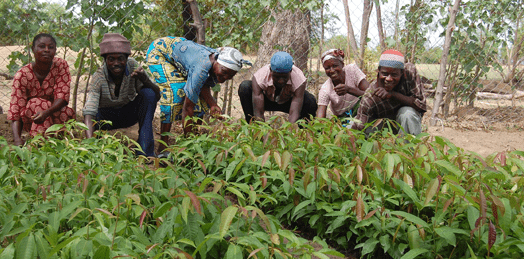The Ministry of Food and Agriculture’s (MoFA) Medium Term Expenditure Framework (MTEF) document for 2024-2027 says government will contribute some GH₵2.7billion of GH₵3.3billion that is the entire amount for implementing government’s flagship Planting for Food and Jobs Phase II (PFJ 2.0).
Indeed, MoFA believes PFJ 2.0 will make the country self-sufficient in all staple commodities by end-2028.
The document mentioned that four budget programmes and modules will be implemented. Those programmes are: Crop and Livestock Development; Mechanisation, Irrigation and Water Management; Agribusiness Development; and Sustainable Management of Land and Environment.
The programme is expected to prioritise commercial agriculture to scale up production and meet domestic food consumption requirements, create strategic food reserves, support industrialisation and reduce food imports toward the goal of establishing sustainable food security and resilience.
However, despite the huge financial allocation and positive anticipation, the Peasant Farmers Association of Ghana (PFAG) has consistently made claims that implementation of the policy’s second phase is skewed with several inconsistencies that do not favour farmers, as it is not well-targetted.
First of all, the Association argues that the only way to ensure proper sustainability of PFJ 2.0 is for politicians to take their hands off the programme and allow technical directors in the ministry to lead the project’s implementation.
This argument is proper, since technical directors at MoFA have the requisite technical know-how to implement a project of national importance that is geared toward food self-sufficiency like the PFJ.
Already, PFAG has revealed that about 80 percent of farmers have not been registered on the programme as of third-quarter this year. One would have to ask who the target beneficiaries are if what PFAG is saying is anything to go by.
Describing the PFJ Phase II as uninspiring, PFAG states that the agriculture sector has been neglected with no direct investment to farmers. The association explained that MoFA prefers makeshift strategies to tangible and solution-driven measures.
To all intents and purposes, the expansion of irrigation projects and improvement of road networks – which are key components of the policy – appear not to have been tackled satisfactorily. No wonder PFAG keeps pointing at implementation challenges – which if not addressed could mar the programme’s outcome.
We hope MoFA sees these comments as constructive criticisms, since PFAG is a major stakeholder in the country’s agricultural landscape.










